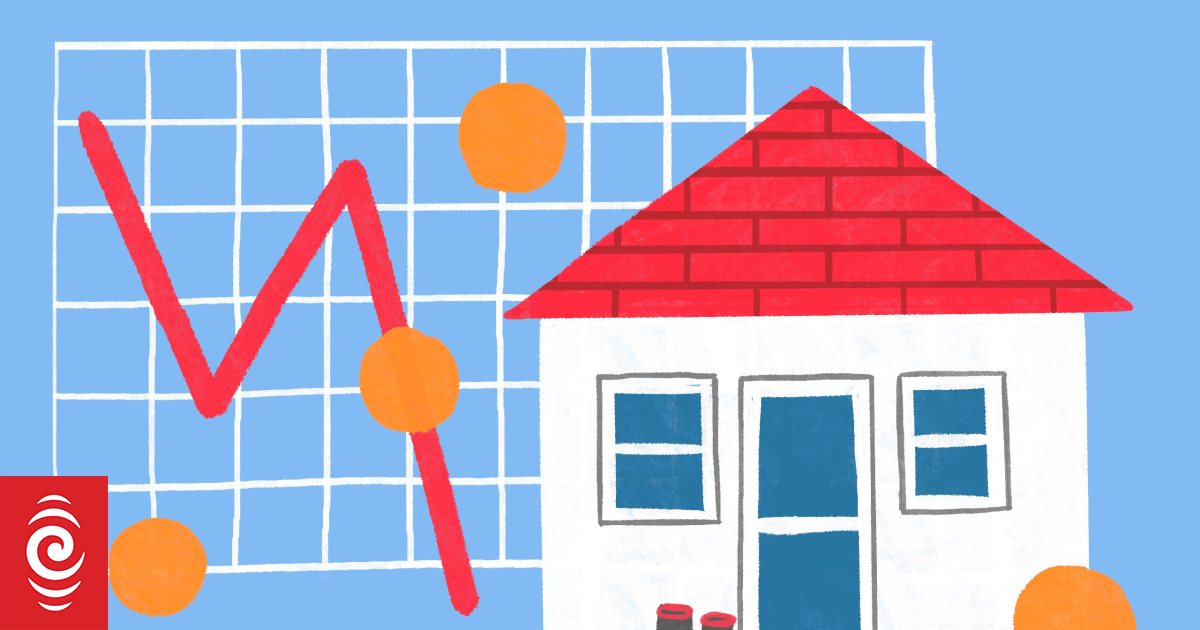
The rebound is being driven by investors who own up to four properties, says Cotality.
Photo: RNZ
Investors seem to be returning to the property market – but why?
Cotality has released its latest property data, which shows that while first-home buyers remain a strong presence in the market, investor activity is picking up.
Mortgaged multiple property owners were responsible for 23 percent of purchases in the second quarter, up from 21 percent in the middle of last year.
In Auckland and Christchurch, they were 26 percent of transactions.
Cotality chief economist Kelvin Davidson said the rebound was being driven by investors who owned up to four properties including their own home. Their share rose from 12 percent to 14 percent.
They seemed to be targeting the more affordable end of the market, he said. Their share of purchases in the bottom 30 percent of properties by price rose from 21 percent last year to 24 percent so far this year.
They were also more likely to buy existing properties, compared to last year, which Davidson said was probably driven by the absence of the tax advantage that used to come with buying a new build.
But forecasts for capital gains are soft. Infometrics expects house prices to be 20 percent lower than 2021’s peak in real terms even next decade.
Rents have also been forecast to be subdued well into next year.
Migration is weak and there has been a lift in housing supply, which keeps the pressure off prices.
“If you’re thinking about the future, well, the tax system might not be quite so favourable for property, the Government’s pushing pretty hard on land supply,” Davidson said.
“We’ve got debt-to-income ratio restrictions now and that long-term downward trend in interest rates can’t be repeated so I think there are reasons to be fairly cautious about future capital growth rates.
“I speak at a few investor events and investors are certainly concerned about costs such as council rates going up.”
So what is pulling investors in?
Davidson said property was still a “trusted” asset class.
“Even if you think capital gains will be lower in the future there will probably still be some capital gains and people have still got their trust factor – they can still see the property, they kind of vaguely know how it works.
“That’s still a factor as to why people are buying rental properties.”
He said the changes to the loan-to-value restrictions and brightline test had helped, and the reintroduction of investors’ ability to offset their interest costs against their income for tax purposes.
“For me the biggest thing is lower interest rates. If you go back to the middle of last year when interest rates were still pretty high, a top up on a standard rental property could have been $400 or $500 a week – that’s pretty chunky for your average mum and dad. Come forward to now and it might be $200 a week. It’s still there but it’s a lot lower than it was. That’s a really big factor.”
He said it would not be a bad thing for investors to focus on the cost and income of a rental property rather than buying purely for the hope of capital gains.
Sarina Gibbon, general manager of the Auckland Property Investors Association, said it did seem counterintuitive for investors to be more active.
“I reckon it is to do with long-term confidence in the resilience of property as an investment vehicle. The ‘headwinds’ are very much perceived as short-term turbulence.
“Overall, there is still a deeply seated belief among Kiwis that property will hold its value better than most other assets over time. Additionally, the sort of control and leveraging power you get with property, you’re just not going to get that with anything else.
“There are also some really interesting paradoxical forces at play. It seems like the weaker the economy gets, the more people are convinced about second or alternative income streams. And property still delivers that overall stability and confidence for Kiwis as a way to support and provide for their families.
“So what we are seeing isn’t a bet on capital gains, it is a hedge against the fading dream of upward mobility. Amongst investors, property is becoming less about wealth creation and more about income replacement. In terms of narrative, we’ve definitely moved away from the Covid era of FOMO, 2025 property investment is very much Plan B.”
Infometrics chief forecaster Gareth Kiernan said the growth was coming off a low base.
“If you look at the number of investor mortgages over the last year… the total of 32,284 is still lower than at any time between 2015 and February 2022.
“I don’t see a lot of substance to the pick-up, or the growth being sustained, particularly when you look at how negative the trends are in rents at the moment, the fact that net migration and population growth are still easing, and consent numbers of about 34,000pa are substantially above underlying demand for new housing.
“Part of the growth over the last year or so is likely to have been driven by more favourable tax treatment for mortgage interest making the numbers financially a bit more attractive …the reduction in the brightline test to two years meaning people are perhaps more willing to take a shorter-term punt on capital gains. The decline in interest rates will also have led to people looking for better returns thank banks are offering, which might have helped buoy investor demand for property a bit.”
Sign up for Ngā Pitopito Kōrero, a daily newsletter curated by our editors and delivered straight to your inbox every weekday.







